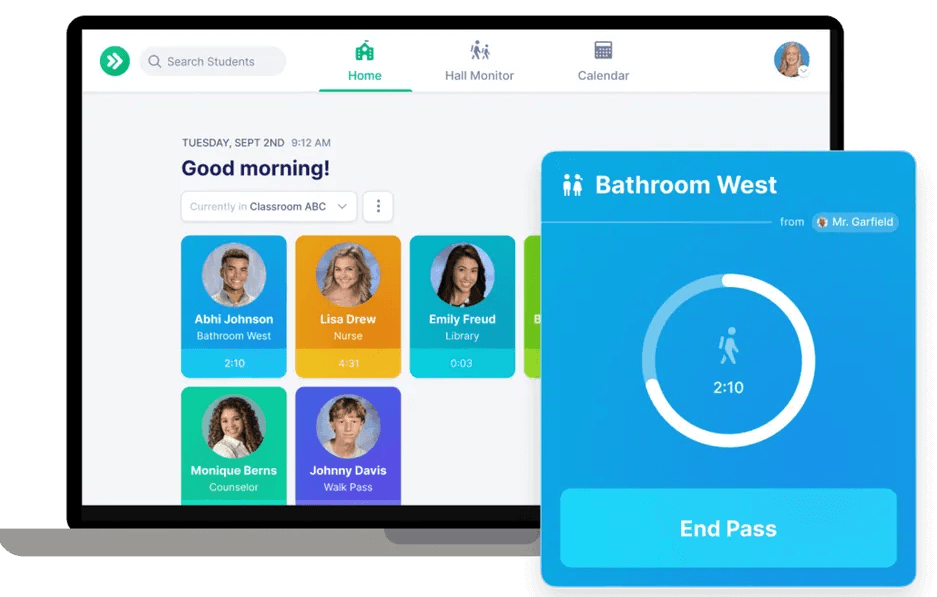Peter Luba ’22
CEO, SmartPass
B.S., Computer Science and Business
Supporting student success and safety through an electronic hall pass solution
Peter Luba ’22 got a head start on his future before he entered Lehigh. He was a high school senior in suburban Philadelphia when his assistant principal visited his coding class to propose developing a digital hall pass to replace the paper and wooden passes traditionally used in schools. Luba and classmate Dhruv Sringari created SmartPass, an app that allows teachers and administrators to track students during the day, monitor class attendance, and gain insights into behaviors.
SmartPass gained new users while Luba was at Lehigh and Sringari studied at Penn State. By the time the pair graduated, the number of schools subscribing to the app was approximately 150. Luba found his Lehigh education valuable in running the business. “It was so cool to take something that I’d learned in marketing class and be able to directly apply it to SmartPass,” he recalls.

Changes in student attendance and behavior in middle and high schools brought on by the COVID-19 pandemic accelerated the app’s growth. “Students just didn’t want to stay in class,” Luba notes. A year after Luba graduated, more than 1,000 schools in six countries were using SmartPass. He quit his job at Salesforce to become SmartPass’s full-time CEO. In the last two years, the company has secured investors and grown to 50 employees. The app’s success earned Luba and his partner a spot on the 2023 Forbes “30 Under 30” list in the education category.
Making It New: Introducing a Student-Driven Process
The traditional system for administering hall and bathroom passes in schools rests solely with teachers, and in 99% of the cases, paper passes are used. There is no way to track the number of times students request passes during the day in different classes. A digital pass streamlines the process and creates a uniform system without adding to teacher workload. “We really want to remove as much as possible from teachers. They’re given enough new technology and software to learn and manage. There’s enough going on in the classroom,” Luba explains. “We’re very student driven. Instead of raising their hand, they click two buttons on their laptop to request a pass.” Their request is automatically confirmed or denied. If students don’t have individual laptops or tablets, they request the pass on a shared classroom computer.

Making a Difference: Promoting Academic Success and Student Safety
SmartPass fosters students’ academic success by supplying detailed data about how much class time is missed. “It truly does help to get students to be in class more and maximize instructional time,” Luba says. “You’re able to pick up on trends, such as whether a student is missing more of their math class and their chemistry class. The information can help to start a conversation with the student.” New Jersey’s Pinelands Regional High School saw a 60% reduction in students cutting class after using SmartPass.
SmartPass also can provide a report showing encounters by two or more students leaving class to go to the same place, providing a safer school environment. If a student has been bullied by another student, the app can be programmed to ensure they won’t receive passes to be in the hall or take a bathroom break at the same time. Administrators can also spot patterns and eliminate the problem of groups congregating to vape or engage in other disruptive activities. It works: Berlin High School in Berlin, Wisconsin, reported a 45% reduction in student behavior referrals after initiating SmartPass.
In the event of building emergencies, such as bomb threats or fires, SmartPass provides quick information about the number of students who are out of the classroom and where they are.

Making It Together: Partnering With Teachers
Luba emphasizes that SmartPass was developed to respond to teachers and administrators’ needs, and their input guides product development. “We're always receiving feedback directly from our customers. They know best,” he says.
New developments for the app — such as tracking student flex scheduling during student activity and club periods — have come directly from teachers. “We have a list of 500-plus feature ideas that customers have submitted,” Luba states. Teachers provide input throughout the development process. “The moment we start researching a feature, we schedule 10 interviews and calls with the people that have requested it, continuing that loop,” he says. “And then the moment we release that feature, we let every single person that has ever requested that feature know that it is available.”
Schools have adapted SmartPass to cover other uses, such as tracking sports dismissals or scheduled visits to the nurse. Features under development include integrating student schedules to identify where a student is at all times during the school day.
“That will ultimately unlock so much more data and analytics capabilities that will be helpful to teachers and schools,” Luba says.



